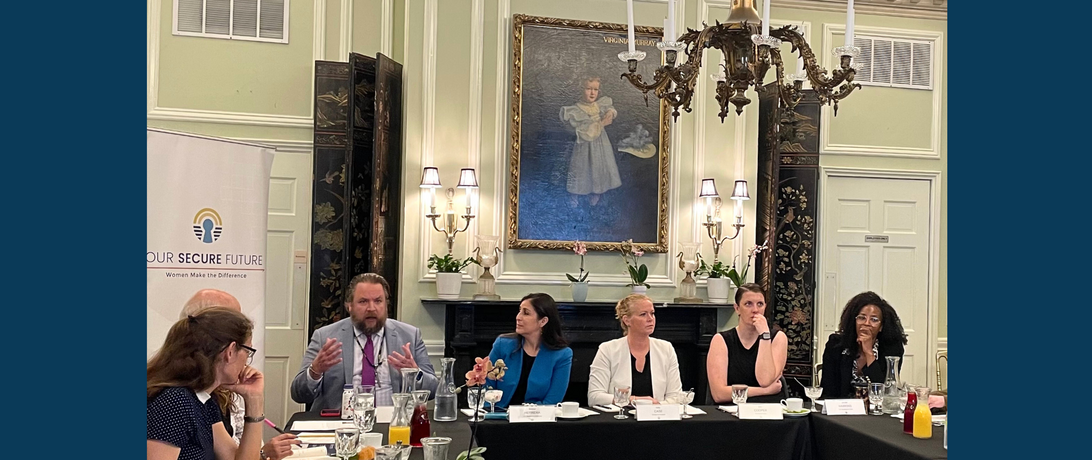
On April 30th, 2024, Our Secure Future led a thought-provoking event aimed at exploring and addressing critical issues surrounding the institutionalization of Women, Peace, and Security (WPS) principles within the United States Government.
This gathering served as a platform for the launch of a new policy brief titled "Institutionalizing Women, Peace and Security: The Role of Gender and WPS Advisors in the United States Government," produced in collaboration with Strategy for Humanity. The brief discusses the accomplishments, challenges, and opportunities faced by gender advisors in integrating WPS principles and a gender lens into US government policies and programs, offering recommendations for strengthening and institutionalizing these endeavors.
The convening had three main objectives: to examine the key findings of the report; to emphasize the crucial role of WPS and gender advisors in enhancing the effectiveness of U.S. foreign policy and national security interests; and to offer a forum for WPS and gender advisors to share their firsthand experiences, discussing the challenges they face and suggesting the most beneficial methods for supporting their ongoing efforts.
The panel was moderated by Our Secure Future Vice President Sahana Dharmapuri and featured the report author, Kelly Case, Managing Director at Strategy for Humanity, in addition to:
- Erin Cooper, Associate Director, Our Secure Future
- Monica Herrera, Senior Gender Advisor, Office of the Under Secretary of Defense for Policy, U.S. Department of Defense
- Dr. Jennifer Hawkins, Division Chief (Acting) Women, Peace, and Security, Secretary’s Office of Global Women’s Issues, U.S. Department of State
- Jeffrey Sizemore, Senior Advisor on Atrocity Prevention, Bureau of Democracy, Human Rights and Labor, U.S. Department of State
Kelly Case commenced the dialogue by articulating the report findings, highlighting the progress made in WPS integration while also shedding light on persistent challenges stemming from resource constraints, notably the availability of human and financial resources for gender advisors. The panelists collectively underscored the indispensable role of collaboration, emphasizing the critical need for sustained engagement and partnership between civil society and government entities to drive meaningful progress in advancing gender equality and peacebuilding efforts.
The discussion also delved into specific success stories and best practices observed across agencies such as the U.S. Agency for International Development (USAID), Department of Defense, Department of Homeland Security, and Department of State. These included initiatives such as increased training on WPS and gender equity, the establishment of dedicated gender advisor roles, and enhanced engagement with women in conflict settings. The discourse addressed prevailing challenges, ranging from inconsistent funding streams and a lack of political will to the pressing need for more robust mechanisms to prioritize gender considerations in decision-making processes.
The event also illuminated promising opportunities for furthering the WPS agenda, including heightened collaboration with civil society organizations, the institutionalization of WPS principles within government frameworks, and leveraging existing platforms such as the WPS Congressional Caucus to amplify advocacy efforts.
The discussion culminated with a series of actionable recommendations put forth by the panelists, notably: mandatory gender training, increased investment in capacity-building for gender advisors, and enhanced professional development opportunities to expand policy expertise across various dimensions of gender. Furthermore, there was a resounding call for the appointment of an Envoy on WPS within the Department of State to provide strategic leadership and coordination in advancing WPS priorities.
The event served as a pivotal moment for fostering dialogue, forging partnerships, and galvanizing collective action toward the institutionalization of WPS principles within the U.S. government. It underscored the indispensable role of gender advisors and the imperative of concerted efforts to overcome challenges and seize opportunities in advancing the agenda of gender equality, peace, and security on both national and global scales.